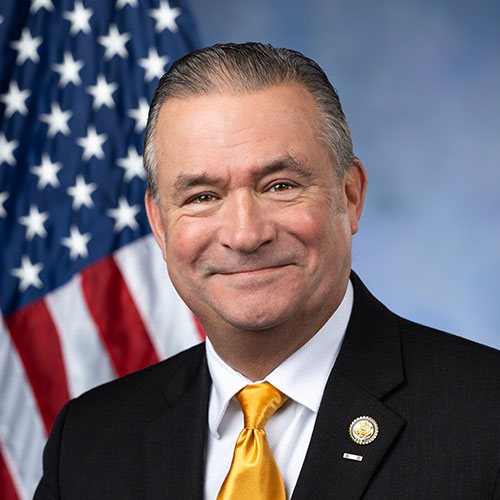eNewsletter
We're Nebraska's U.S. Congressmen. Here's why we supported the Big Beautiful Bill
Washington,
July 12, 2025
In Case You Missed It: We're Nebraska's U.S. Congressmen. Here's why we supported the Big Beautiful Bill By U.S. Congressmen Mike Flood, Don Bacon, and Adrian Smith Omaha World-Herald July 12, 2025 Last week, before we voted to send HR 1 (the One Big Beautiful Bill Act) to President Trump for his signature, House Democratic Leader Hakeem Jeffries gave a speech in which it was clear Leader Jeffries had overlooked what the Tax Cuts and Jobs Act (TCJA) and other proven policies in HR 1 have achieved for the American people. We would like to share why the bill will bring to America the sanity voters called for in November 2024. Medicaid is a lifeline for the neediest Americans, young and old. Unfortunately, its current, unsustainable fiscal trajectory weakens the program as federal outlays have more than doubled since 2012. To strengthen the program’s long-term outlook and integrity, HR 1 requires able-bodied Medicaid beneficiaries ages 19-64 without children to work, attend school, or volunteer an average of 20 hours per week. Work requirements signed into law by President Clinton in 1996 showed millions of welfare recipients could improve their lives through economic opportunity, and we expect HR 1 will similarly help bring a significant number ofAmericans in from the sidelines of our economy. While abuse and errors within Medicaid are rampant, the CBO estimates the safeguards in HR 1 will hold states accountable to address the 1.4 million illegal immigrants enrolled in state programs funded by taxpayers, an additional 1.3 million Medicaid beneficiaries who are enrolled but ineligible, and 1.6 million individuals enrolled in Medicare in two states simultaneously. Altogether these changes account for most ofthe Medicaid savings in HR 1 while putting Medicaid on sounder financial footing to continue serving pregnant women, parents, children, elderly, and disabled Americans. HR 1 also repeals Biden-era nursing home staffing requirements that would have closed rural facilities and includes an additional $50 billion in funding for states to boost rural hospitals and access to care. As with Medicaid, Supplemental Nutrition Assistance Program (SNAP) spending has nearly doubled in recent years from $60 billion in 2019 to $100 billion in 2024. The ballooning spending is due in part to the current patchwork of state waivers, leaving little incentive for states like California or New York to address high payment error rates. Under HR 1, states with error rates exceeding 6 percent would be required to match federal funding dollar for dollar. Given Nebraska’s current SNAP error rate of 5.5 percent and other incentives in the bill, we fully expect our state will not be subject to matching requirements, and Nebraska’s leadership will show other states how to choose program integrity over the penalty. Following passage of TCJA in 2017, federal revenue outpaced estimates by the Congressional Budget Office(CBO) while bringing historic relief to American families and small businesses. We lowered tax rates for all, rewarded investment in American jobs, and created the first real set of tax rules to discourage corporations from offshoring American jobs and tax revenues. After we doubled the standard deduction and the child tax credit, a typical single mom with two kids earning $50,000 pays no federal income tax. We also ensured family-owned farms, ranches, and small businesses had a level playing field with corporations by creating a 20 percent deduction for passthrough income. As result, the top 1 percent of earners now pay more than 40 percent of income taxes, compared with 24 percent prior to TCJA. While these provisions were temporary due to Senate rules, HR 1 makes these tax cuts permanent. In addition, it increases the standard deduction by another $6,000 for seniors to help ensure Social Security benefits aren’t double-taxed. To reward businesses that choose to invest more in the United States, it makes permanent the small business deduction, restores full expensing for research and development costs and small business equipment, and raises the cap on business interest deductibility. Over the past six months, President Trump’s actions to end catch-and release, reinstate “remain in Mexico,” and ensure our internal immigration enforcement agencies are performing their jobs, have demonstrated how policies can profoundly improve conditions on our southern border. To ensure the Trump administration has the necessary resources to continue enforcing our immigration laws and better process those who want to enter the United States legally, HR 1 provides $80 billion in funding for the agencies responsible. We supported this legislation in May, and we supported it again last week when it returned from the Senate. It contains important measures to protect families across Nebraska from threats at our borders and abroad while providing the certainty they need to earn, save, and plan for their futures. U.S. Rep. Don Bacon represents Nebraska's 2nd Congressional District in the U.S. House of Representatives. U.S. Rep. Mike Flood represents the state's 1st Congressional District. U.S. Rep. Adrian Smith represents the 3rd Congressional District.
|

